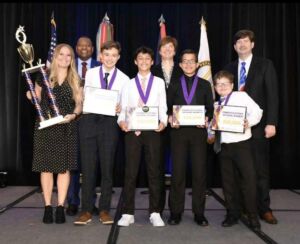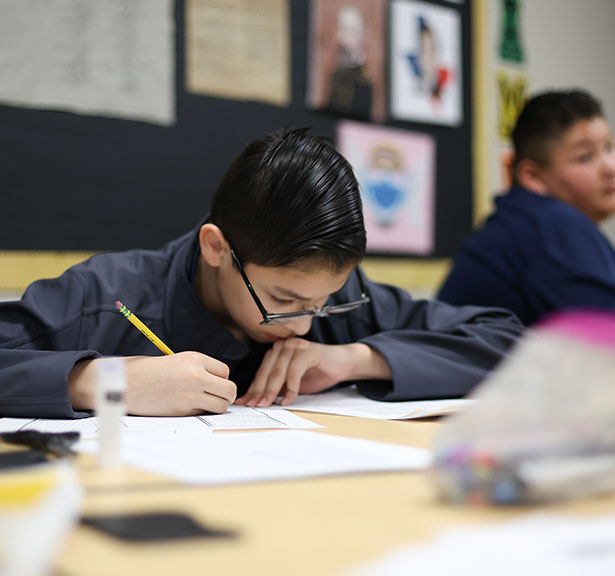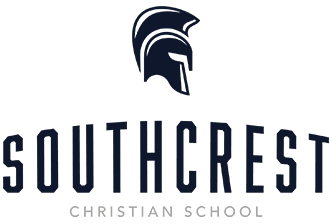Authentic learning with purpose, reaching all types of learners, and focusing on students’ individual strengths and intelligences are key to a successful middle school classroom. Students are provided a strong biblical foundation for the challenges life brings as well as a strong intellectual foundation for training tomorrow’s leaders. Through modeled missions and emphasis on service, SCMS creates global citizens who know, love, and serve their Savior.
Middle School Program Highlights Include:
Retreat – Early in the school year, middle school students spend two days away on retreat. This is a wonderful bonding time full of fun activities, food, worshiping, and devotions.
eCYBER –  2024 marks the 22nd year of eCYBERMISSION which is a STEM competition sponsored by the Army Educational Outreach Program and the National Science Teachers Association. It is a project-based competition for students in 6th – 9th grades whereby students on teams of 2-4 students identify a community problem and solve it using science, technology, engineering, and mathematics (STEM). The students work through scientific inquiry or the engineering design process and submit their work (typically 4 weeks to 10 months depending on the team’s ambitions) online under the guidance of Team Advisor, usually a STEM teacher at SCS. Judges rank each project state by state and by grade level for a $1,000/$500 award to each student of the Texas 1st or 2nd Place Team. When a team wins 1st place in Texas, if their score is also one of the top 3 in the U.S. South Central region of 8 states, each student receives an additional $1,000. Those 3 regional qualifying teams then prepare a presentation and present their project online to a panel of judges in April. The top team at each grade level in the region then receives an all-expense paid trip to the Washington DC area in June to compete at nationals and receive an additional $2,000 for each student of those teams. The 20 teams at nationals compete by grade level with the winning students taking home an additional $6,000 for a national award total of $10,000 per student.
2024 marks the 22nd year of eCYBERMISSION which is a STEM competition sponsored by the Army Educational Outreach Program and the National Science Teachers Association. It is a project-based competition for students in 6th – 9th grades whereby students on teams of 2-4 students identify a community problem and solve it using science, technology, engineering, and mathematics (STEM). The students work through scientific inquiry or the engineering design process and submit their work (typically 4 weeks to 10 months depending on the team’s ambitions) online under the guidance of Team Advisor, usually a STEM teacher at SCS. Judges rank each project state by state and by grade level for a $1,000/$500 award to each student of the Texas 1st or 2nd Place Team. When a team wins 1st place in Texas, if their score is also one of the top 3 in the U.S. South Central region of 8 states, each student receives an additional $1,000. Those 3 regional qualifying teams then prepare a presentation and present their project online to a panel of judges in April. The top team at each grade level in the region then receives an all-expense paid trip to the Washington DC area in June to compete at nationals and receive an additional $2,000 for each student of those teams. The 20 teams at nationals compete by grade level with the winning students taking home an additional $6,000 for a national award total of $10,000 per student.
In 2017, Southcrest Christian School made the transition to project-based science classrooms under the guidance of Science Instructional Coach, Laura Wilbanks, bringing the eCYBERMISSION competition to our school. In the six years since our students began participating, they have achieved great success to God’s glory and made wonderful changes to the local and scientific community. Southcrest middle schoolers have been awarded over $353,000 directly to the students in the form of U.S. Savings Bonds. Led by SCS faculty and STEAM Team Advisors Laura Stary, Milene de Farias, Michelle Bueermann, and mentor Laura Wilbanks, this makes Southcrest Christian School the top school in the nation during this period.

2017 – 2024 Statistics
Texas State 1st Place, Runner-up, Honorable Mention – 32 teams
Texas State 1st Place Winners – 18 teams
U.S. South Central Regional Finalists – 17 teams
National Finalist teams – 17 teams
National Winners – 9 teams
Outstanding SCS Teams and Projects
More than a virtual science fair, eCYBERMISSION combines science/engineering with teamwork, mentorship from experts, project-based learning, and benefit to the community in order to provide an authentic learning experience for students.
2018 Nationals – 7th graders called the Cricketeers worked with Breedlove and Lubbock Impact and developed nutritious food for 3rd World countries using crickets as the protein source.
2019 Nationals – 6th graders known as Hot Cars worked with engineers and parents who had lost children in hot cars. They developed an app that would alert parents if they left their car without checking the carseat in the back, and ran an educational campaign to reduce deaths in Texas – the state with the most deaths due to hot cars.
2019 Nationals – Oh, Deer! – 7th graders worked with the Texas Department of Transportation to plant roadsides with plants that are highly reflective and light up a night highway in order for drivers to see deer 30% more effectively than other devices on the market.
2020 Nationals – 6th graders named the Carbon Keepers worked with the National Resources Conservation Service (NRCS), area farmers, KerTec, and soil scientists at Texas Tech to develop methods of keeping carbon in the soil and out of the atmosphere
To Cedar Busters, who won nationals in 2020, Jett Hurst was also on the team
2020 Nationals – 7th graders known as Code Red worked with firefighter Abi Morales and stations throughout the city to educate others about the need to wash uniforms multiple times in order to reduce the cancer risk inherent to firefighters.
2020 State Honorable Mention – the Rio Trio 6th graders – conducted water quality surveys from the headwaters to the tailwaters of the Rio Grande River. Their project spanned 3 states and 2 countries while providing essential data to the EPA.
2021 Nationals – 6th grade team: Cedar Busters worked with LCU scientists, NRCS, and multiple federal land agencies to control the spread of salt cedar along the Brazos River. They won nationals and also a $10,000 grant from Lead4Change because of the positive impact their project had on the South Plains.
2021 State Winner – 9th graders called Reefs from Relics worked with teachers in Puerto Rico to use old discarded wind turbine blades as infrastructure for coral reefs in areas where they’re endangered.
2022 Nationals – Plastic Patrol 7th graders tested and compared 26 types of algae that could be used to hyperaccumulate and collect microplastics from oceans and freshwater, working with agencies across Texas and Florida.
2022 Nationals – the 8th grade team called Counterfeit Catchers worked with local experts in Navajo textiles to identify authentic rugs and blankets in the Native American art trade where counterfeit pieces are diminishing the value of indigenous people.
2023 Nationals – 6th graders that went by 1 Peter 5:7 implemented strategies for classrooms and individuals who experience anxiety and stress at school. Their project was chosen to also receive a $5,000 grant to provide light covers, diffusers, sound machines, and fidget toys for every classroom at Southcrest.
2023 Nationals – 7th grade team known as H2O Bros worked with state agencies and oil companies to clean up the fracking industry and conserve the endangered Ogallala Aquifer. The were named eCYBERMISSION 7th Grade National Champions for their research.
2023 Nationals – 8th graders called HydroAid worked with the Institute for Environmental and Human Health and Reese Air Force Base Clean-up Committee to address the water quality resulting from PFAS contamination near Air Force bases. Their work brought to light the expense of purifying water for individual homes and offered a solution of storing contaminated soil to layers of Permian salt deep under aquifers in southeastern New Mexico.
2024 Nationals – 6th graders called Momentum Charge noted the use of fossil fuels as a source of energy is creating a crisis for our nation. It is estimated that these fuels will be depleted within the next 75 years, yet we rely on them for over 75% of our energy needs. 43% of greenhouse gas emissions come from fossil fuels, with vehicles being a major source of these emissions. The U.S. is transitioning to electric vehicles, but they ultimately rely on fossil fuels for charging. Is it possible to create a device that would harness and store a charge for an electric vehicle, utilizing the mechanical energy of wind produced by the car? Could this allow the car to travel further on a charge and decrease the use of electricity to charge the batteries? During research studies, microblades have been tested by mounting small wind turbines onto the grill of cars, but inefficiency has been a problem. The team’s goal was to increase the amount of energy stored for charging and determine if a different blade style could overcome previous inefficiencies. Three different blade models were created, 3D printed, and tested to determine their efficiency. The designs included traditional 3-blade and 5-blade models, as well as a spiral design inspired by Archimedes’ mathematically designed spiral from 225 BC. Efficiencies of the blades were tested with a wind source, tachometer, and multimeter, and it was discovered that the Archimedes blade was far superior to the traditional designs for creating energy using wind and drag. The use of this ancient design could potentially support today’s energy needed to charge a generator while a car is in motion and be the answer for a clean, free, and renewable energy resource for charging electric vehicles. Momentum Charge was named eCYBERMISSION 6th Grade National Award Winners for this project.
2024 Nationals – 7th graders called Code M&M studied the efficacy of different natural additives to promote wound healing, even developing a smart bandage with the ointment they developed.
Southcrest’s 25+ projects involve interesting topics like creating affordable and nutritious dog kibble, harnessing wind energy to give electric vehicles extra miles of service, developing a smart bandage to prevent infection in wounds, and creating games and books to promote learning for children with Down’s Syndrome. We look forward to seeing how each team changes the world this year!
Additional Highlights Include:
- Competitive sports
- Mission projects
- Project based learning
- STEM (Science, Technology, Engineering and Math) competitions
- Math Olympics
- Multi-award-winning band
- Intensive reading program
- Regional and state science fair
- Creative arts and life skills
- National Junior Honor Society
- Nationally recognized and award-winning eCYBER Mission Projects

Math Curriculum
Saxon and TEKS created curriculum.
Science Curriculum
TEKS created curriculum and Apologia.
English / LA
TEKS created curriculum, ABEKA.
Reading
Foundations & Frameworks.
History Curriculum
Texas History (Prentice-Hall) American History (McGraw-Hill).
Bible Curriculum
Positive Action for Christ and teacher created curriculum.

